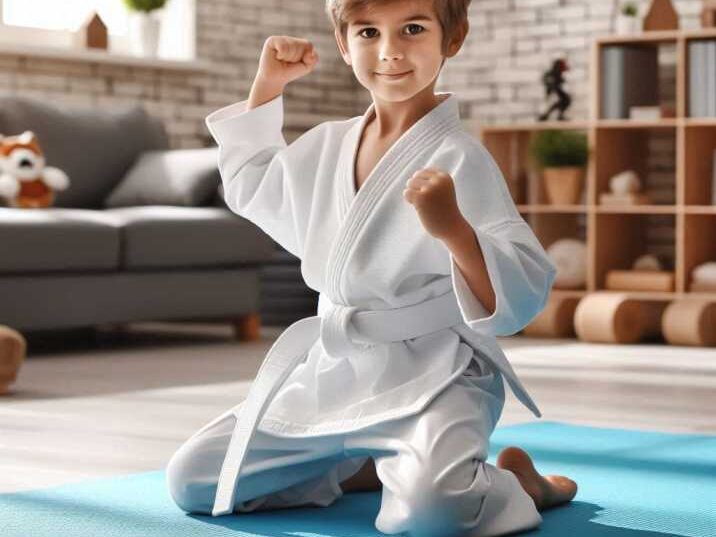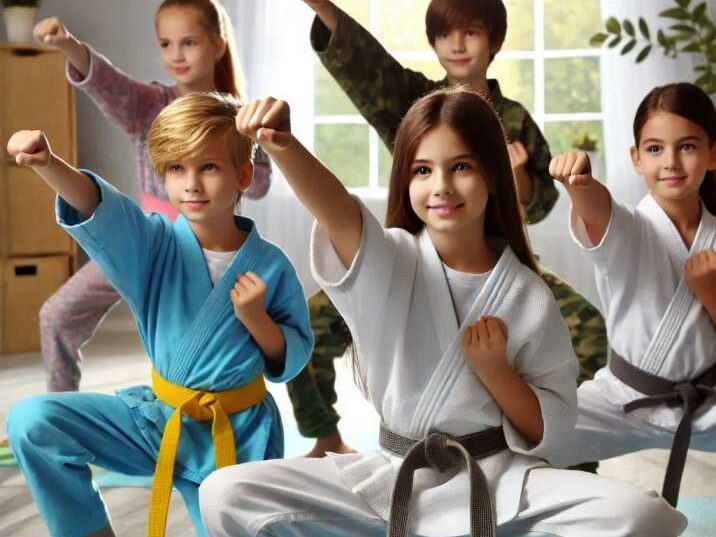Martial arts is not just about punches and kicks—it’s a holistic approach to developing a child’s physical, mental, and emotional well-being. Through structured training, children learn valuable life skills that help them thrive both in and out of the dojo. In this article, we’ll explore why martial arts is important for kids, highlighting its many benefits with facts and examples.
Introduction
Table of Contents
In today’s fast-paced world, finding an activity that teaches kids both life skills and physical fitness can be challenging. That’s where martial arts steps in! Beyond the physical benefits, martial arts instills confidence, focus, and respect, making it one of the best activities for kids. Whether your child is shy, energetic, or somewhere in between, martial arts has something valuable to offer.

Key Benefits of Martial Arts for Kids
1. Discipline and Responsibility
Discipline is a core value in martial arts, where kids are taught to follow instructions, maintain routines, and respect their instructors and peers. This structured approach helps children understand the importance of rules and responsibility, building habits that extend beyond the dojo. Over time, the discipline learned in martial arts translates to better behavior at home and improved focus and performance in school. For instance, a study published in the Journal of Pediatrics revealed that children who practice martial arts show a 20% improvement in classroom behavior compared to their peers, showcasing its positive impact on overall development.
2. Boosts Self-Confidence
Martial arts offers children the opportunity to set and achieve goals, such as earning higher-ranking belts or mastering challenging techniques. Each milestone accomplished instills a sense of pride and self-worth, building their self-confidence. This growth is especially beneficial for shy or reserved children, as the supportive environment helps them come out of their shells. Through group activities and leadership roles, they learn to speak up and take initiative, gaining the assertiveness needed to succeed in other areas of life. This transformative journey fosters a lasting belief in their abilities.
3. Improves Focus and Concentration
Martial arts demands a high level of focus and concentration, as children must carefully listen to instructions and execute techniques with precision. This practice trains their minds to stay present and sharp, skills that easily carry over to schoolwork and daily activities. For kids with ADHD or learning challenges, martial arts can be particularly beneficial, as regular practice helps strengthen the brain’s ability to concentrate. This enhanced focus not only improves academic performance but also builds valuable life skills like patience and problem-solving.
4. Physical Fitness and Health
Martial arts provides a dynamic and engaging way for kids to stay physically active while having fun. The training incorporates cardio, strength-building, and flexibility exercises, offering a full-body workout that promotes overall health. With rising concerns about childhood obesity, martial arts is an excellent way to meet the CDC’s recommendation of at least 60 minutes of daily physical activity for children. It also instills a lifelong habit of staying active, reducing health risks like diabetes and heart disease as they grow.
5. Self-Defense Skills
One of the most practical benefits of martial arts is teaching children how to protect themselves. Kids gain confidence knowing they have the skills to handle challenging situations, but they’re also taught to avoid violence and resolve conflicts peacefully. Martial arts emphasizes discipline and responsibility, ensuring that self-defense techniques are used only as a last resort. This balanced approach helps children feel empowered without fostering aggression, preparing them to face the world with both courage and restraint.
6. Reduces Stress and Anxiety
Martial arts offers a healthy outlet for stress and anxiety by combining physical activity with mindfulness practices. Martial arts training often includes breathing techniques and meditation, which teach kids how to calm their minds and handle stressful situations effectively. Additionally, physical exercise releases endorphins, the “feel-good” hormones, which naturally boost mood and promote a sense of well-being. Over time, martial arts helps children build emotional resilience, enabling them to approach challenges with a positive mindset and reduced anxiety.
7. Teaches Respect and Empathy
Respect is a cornerstone of martial arts, where children learn to honor their instructors, peers, and themselves. Training emphasizes the importance of humility, discipline, and understanding others’ perspectives. By practicing with classmates, kids develop teamwork and empathy, as they must trust and support one another during drills. These lessons in respect and empathy extend beyond the dojo, shaping them into kinder and more compassionate individuals in their daily lives.
8. Builds Leadership Skills
Martial arts training nurtures leadership by giving advanced students opportunities to mentor beginners. Acting as role models, they guide and encourage others, developing skills like communication, responsibility, and teaching. These leadership experiences help children gain confidence in their abilities and prepare them for future roles in school, sports, and beyond. Martial arts fosters a sense of accountability, inspiring kids to lead with empathy and integrity.
9. Enhances Social Skills
Martial arts classes create a supportive community where kids can interact with peers, build friendships, and develop social confidence. Group activities encourage collaboration and communication, helping children learn how to work effectively with others. For shy or introverted kids, this environment is particularly valuable, providing a safe space to come out of their shell. As they build relationships through shared experiences, they gain the social skills needed to thrive in various settings.

10. Instills Lifelong Values
Martial arts training emphasizes timeless values like discipline, perseverance, and integrity, which remain with kids throughout their lives. The lessons learned during training—such as the importance of hard work, humility, and self-control—shape their character and decision-making. Martial arts doesn’t just focus on physical skills but also fosters mental and emotional growth, preparing children to navigate life with confidence, resilience, and respect for others. These core values provide a strong foundation for success in all areas of life.
What Martial Arts Styles Are Best for Kids?
Certain styles, such as Karate, Taekwondo, and Brazilian Jiu-Jitsu, are particularly suitable for kids. Each style offers unique benefits, from self-defense to improved coordination.
How Often Should Kids Practice Martial Arts?
Most experts recommend 2–3 classes per week to balance progress and avoid burnout.
What Age Can Kids Start Martial Arts?
Children as young as 4 can begin martial arts, focusing on fun and basic skills.
Table of Information about Martial Arts is Important for Kids
| Benefits of Martial Arts for Kids | Details |
|---|---|
| Improved Discipline | Martial arts emphasizes rules, respect, and routines that build discipline. |
| Boosted Confidence | Achieving belts or mastering moves boosts self-esteem. |
| Better Focus | Training improves concentration, aiding performance in school. |
| Self-Defense Skills | Kids learn how to protect themselves responsibly. |
| Physical Fitness | Builds strength, flexibility, and overall health. |
| Stress Relief | Martial arts for kids help manage emotions and anxiety. |
| Social Skills | Encourages teamwork, communication, and respect. |
Conclusion
Martial arts training is more than just an activity—it’s a tool for developing kids into confident, disciplined, and well-rounded individuals. By combining physical exercise with essential life skills, martial arts equips children with the tools they need to succeed in school, relationships, and beyond. If you’re looking for an activity that benefits both the mind and body, martial arts is the perfect choice for your child.
FAQs
1. Why is martial arts good for kids?
Martial arts training improves focus, discipline, and physical fitness while teaching valuable life skills like self-confidence and respect.
2. At what age can kids start martial arts?
Kids as young as 4 can start martial arts, focusing on basic techniques and fun activities.
3. How does martial arts help in school?
Martial arts enhances focus, discipline, and time management, which can lead to better academic performance.
4. Is martial arts safe for kids?
Yes, martial arts is safe when taught by qualified instructors and with proper safety gear.
5. Which martial arts style is best for beginners?
Styles like Karate, Taekwondo, and Brazilian Jiu-Jitsu are great for beginners due to their structured programs and focus on basic techniques.


